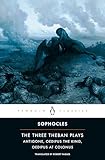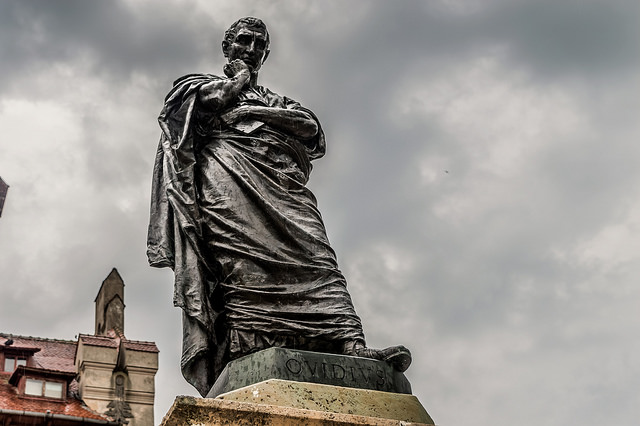In 1942, the classicist Edith Hamilton acknowledged the “dark spots” which encroach upon the worlds of Greek myth. Reading ancient poetry today makes you realize how those dark spots have grown. They may be sinister, but like black holes, they suck you in. They are timely reminders of the continuing power of classical verse.
There is nothing like ancient poetry for making you reassess your priorities. Homer, Virgil, and Ovid can make you feel small and insignificant, but those feelings tend to pass and are worth enduring for the clarity they bring to the bigger picture. If you only let them in, the poets of ancient Greece and Rome can bring the kind of life you are living and person you want to be into sharper focus. They are surprisingly adept at cutting through the noise of modern life.
 Ovid captures the zeitgeist better than any contemporary writer I know. It’s remarkable, considering he died in the early first century, but his words have taken on new significance in the past few years. Where his Metamorphoses once seemed strange and fantastical, with their stories of girls turning into trees and sculptures transforming into living flesh, they now read like an entree to conversations of human fluidity.
Ovid captures the zeitgeist better than any contemporary writer I know. It’s remarkable, considering he died in the early first century, but his words have taken on new significance in the past few years. Where his Metamorphoses once seemed strange and fantastical, with their stories of girls turning into trees and sculptures transforming into living flesh, they now read like an entree to conversations of human fluidity.
A young man named Actaeon is out hunting when he stumbles upon the goddess Diana bathing. In her fury, the deity turns him into a stag. Unable to feel at home in his former palace or the woods with other animals—“shame impeded one route and fear the other”—Actaeon is torn apart by his hunting dogs and sense of displacement. There has never been a better description of what it’s like to be uncomfortable in your own skin. Other characters in the Metamorphoses are more fortunate. They change form to better manifest who they really are.
The anguish of Actaeon suggests to me that escapism shouldn’t be the primary reason for reading ancient poetry today. For sure, there’s diversion and joy to be found in the drinking poems of Horace—nunc est bibendum!—or the Cyclops-haunted adventures of Odysseus. Virgil even provides a lively debate on the virtues of the countryside relative to the city. Perfect for the daily commute. But it’s when the poets turn to their struggles and political angst that their voices feel most modern. Read them not for escapism but for the reverse: They found the words to express the dark spots we’re still facing today.
Long before the birth of Ovid, in the fifth century B.C., the Greek tragedians put the human condition under the microscope. No flaw or contradiction went unexplored. In his Bacchae, the poet Euripides let the tension play out between our inner wildness and outer sense of propriety. Is it better to suppress your desires or give free rein to curiosity? In the play, the reputation of a king is on the line. Put yourself in his shoes and you realize the stakes now feel somehow higher. Anyone today can suffer public humiliation for making the wrong choice. Let yourself go at your peril.

 The Greek poets understood that extreme situations bring out the best and worst in us. That’s why they liked to present their characters with impossible choices. Sophocles’s Antigone, the inspiration for this year’s Women’s Prize for Fiction winner, Kamila Shamsie’s Home Fire, forces its protagonist to choose between obeying the law of her uncle and the authority of the gods. In choosing to bury her late brother, who died an alleged traitor, Antigone honored divine law. She has gone down in history as one of the great political protestors.
The Greek poets understood that extreme situations bring out the best and worst in us. That’s why they liked to present their characters with impossible choices. Sophocles’s Antigone, the inspiration for this year’s Women’s Prize for Fiction winner, Kamila Shamsie’s Home Fire, forces its protagonist to choose between obeying the law of her uncle and the authority of the gods. In choosing to bury her late brother, who died an alleged traitor, Antigone honored divine law. She has gone down in history as one of the great political protestors.
When I try to express the sense of unease I feel over politics today, though, it’s the Roman poets I turn to first. Rome of the late first century B.C. was not so very different from the White House or Westminster. The rise of Julius Caesar, Pompey the Great, and populist politics which threatened the status quo was far from universally embraced. The Latin poet Catullus, best known for his passionate poems to his lover Lesbia, grappled with a new question: How do you react to a people-pleaser without feeding his ego? At first, he recommends nonchalance:
I have absolutely no desire to want to please you, Caesar,
Nor to know the smallest thing about you.
And if that doesn’t work? Turn up the temperature without losing your humor. Not even the fact that Caesar was a friend of his father prevented Catullus from branding him a “shameless, grasping gambler” and worse in acerbic verse. His message got through. Caesar was offended by the poems. He forgave their author. I defy anyone to read a book of Roman polemics and resist nodding along to at least some of them.
At their best, the works of the ancient poets read like social commentary of our own times. They brim with uncomfortable but necessary home truths and highlight what really matters. A surge in translations of classical texts in recent years has brought the ancient poets even closer to us, the language no longer a barrier to our understanding. I’d wager that an hour spent in their company would reveal more about the realities of our world than a thousand scrolls of Twitter or Instagram ever could.
Image: Flickr/Balcon del Mundo









